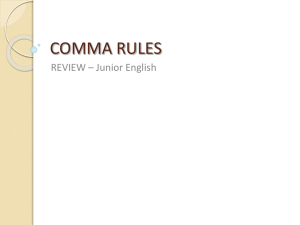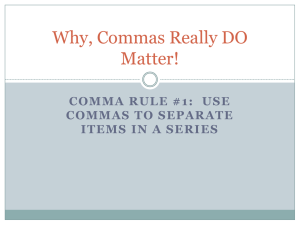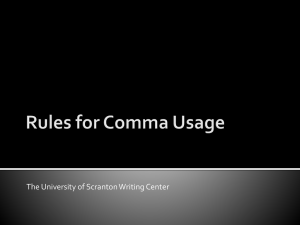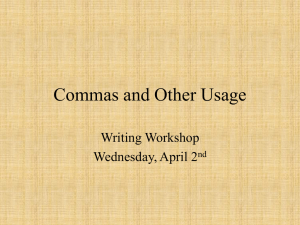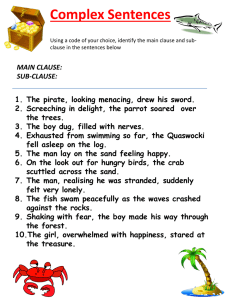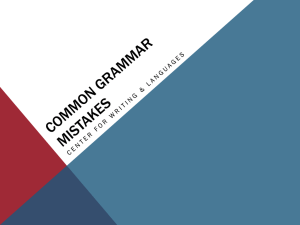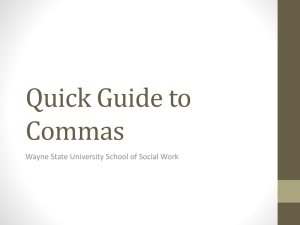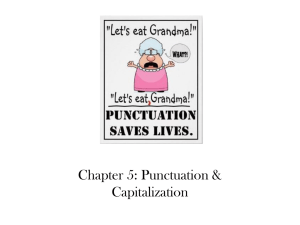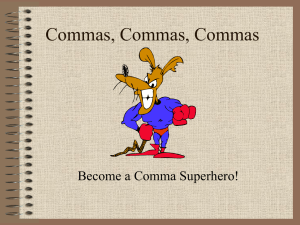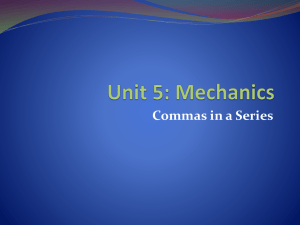Commas PPT ch.14
advertisement
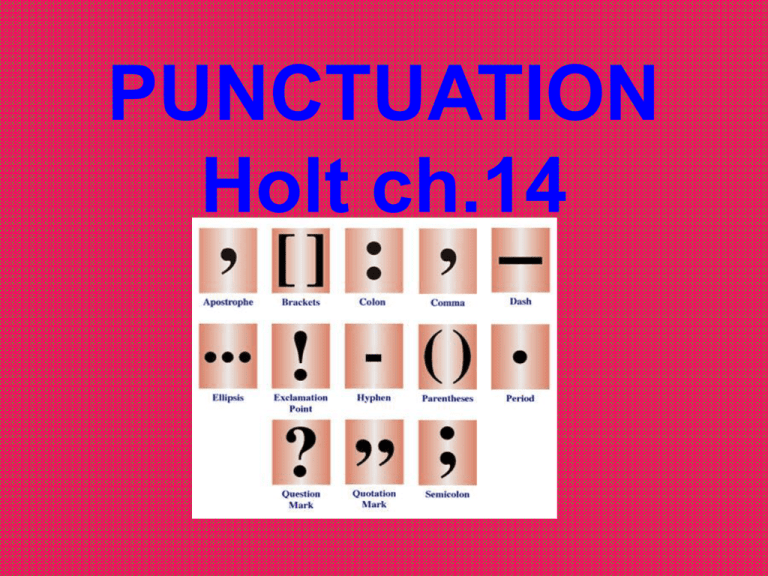
PUNCTUATION Holt ch.14 COMMAS wksht. A RULE 1: Use a comma to separate words, phrases, or clauses in a series of three or more. , , The dog went in the house, to his bowl, and up the stairs. She had a bagel an apple and juice. (words) (phrases) , , We ate we danced and then we left. (clauses) COMMAS wksht. A RULE 1: Use a comma to separate words, phrases, or clauses in a series of three or more. Some writers do not use the COMMA before the conjunction with a series, but you SHOULD use a comma there! She cried, kicked and screamed during the tantrum. NO!! She cried, kicked, and screamed during the tantrum.YES!! COMMAS wksht. A RULE 2: use a comma between two adjectives (in a row) preceding a noun wild, aggressive dog Do the check test. Can you switch them around? Can you use “and”? wild and aggressive dog aggressive and wild dog If the switch makes sense, you need a comma. COMMAS wksht. A RULE 2: two adjectives in a row describing a noun fat, hairy cat steamy, delicious soup hairy, wild Siberian husky ugly, vicious French poodle warm, crunchy French bread COMMAS wksht. B RULE 3: Use a comma before a conjunction (FANBOYS) when it joins independent clauses in a sentence. I wanted vanilla ice cream. All they had was chocolate. , I wanted vanilla but all they had was chocolate. (subject and verb) , BUT (subject and verb) (independent) , BUT (independent) COMMAS wksht. B RULE 3: Use a comma before a conjunction (FANBOYS) when it joins independent clauses in a sentence. DO NOT BE FOOLED! WARNING! DO NOT BE FOOLED! MAKE SURE THAT THERE ARE TWO INDEPENDENT CLAUSES AND THAT BOTH CONTAIN A SUBJECT AND A VERB in order to use the comma between the independent clauses! Usually we study in the morning and play basketball in the afternoon. (subject and verb) , and (verb) COMMAS wksht. C RULE 3: Use commas to set off an expression that interrupts a sentence. Two commas are needed if the INTERRUPTER is in the middle of the sentence. Anne Meyers, our neighbor, is a good golfer. One comma is needed if the INTERRUPTER starts or ends the sentence. Of course, I would like to win. My answer is correct, I suppose. COMMAS wksht C Do not worry about essential versus non-essential! This is an eighth or ninth grade standard. Cross off activity B on worksheet C side! For now, put commas around all interrupters whether essential or not! COMMAS wksht C Types of interrupters: Participial Phrase: A phrase that looks like a verb, but it functions as an adjective. Paul, thrilled by the applause, took a bow. My sister, listening to the radio, did not hear me. Ellis Island, rebuilt as a museum, opened in 1990. COMMAS wksht C Types of interrupters: Adjective Dependent Clause: who, whose, which, whom (along with a verb) Paul, who won the contest, took a bow. My sister, whom I dislike, did not hear me. Ellis Island, which was rebuilt, opened in 1990. COMMAS wksht C Types of interrupters: Appositive phrase: noun/pronoun phrase used to identify or rename the subject. Paul, my neighbor, took a bow. My sister, the littlest, was there. Ellis Island, the museum, opened in 1990. COMMAS wksht D Types of interrupters: Direct Address: speaking directly to a person or group of people Paul, take a bow please. Take a bow, Paul, please. Take a bow please, Paul. EXAMPLES: Good work, students. Congratulations, track team! Help me, boys! Did you hear me, Jennifer? EXAMPLES: Ladies, get ready. Gentlemen, let’s go! Happy birthday, Brenden! Congratulations, Mom! COMMAS wksht D Types of interrupters: Parenthetical Expression: a side remark that could be in parenthesis; not very important, and kind of conversational or transitional Paul, by the way, took a bow. My sister, of course, was there. Ellis Island, I suppose, opened in 1990. COMMAS wksht D Common Parenthetical Expressions BY THE WAY IN FACT HOWEVER I SUPPOSE NEVERTHELESS I BELIEVE TO TELL THE TRUTH IN MY OPINION ON THE OTHER HAND COMMAS RULE 4: To set off introductory of prep phrases of 5 or more words From my house to your house, it is five miles. Near the old general store, there is a gas station. COMMAS RULE 5: To set off introductory WORDS First, I want to go home. Then, I want to have a snack. Yes, it will be a healthy one. But, I want ice cream. Still, I will resist the temptation. COMMAS RULE 6: To set off an introductory dependent clause After she won the trophy, we celebrated. DEPENDENT CLAUSE STARTERS AS ALTHOUGH AFTER BEFORE BECAUSE IF IN ORDER TO SINCE UNTIL UNLESS WHEN WHENEVER WHERE WHEREVER WHILE WHETHER EXAMPLES , Since you did not sleep well you are tired. Because you are tired, you fell asleep at school. When the teacher called home, you were worried.
